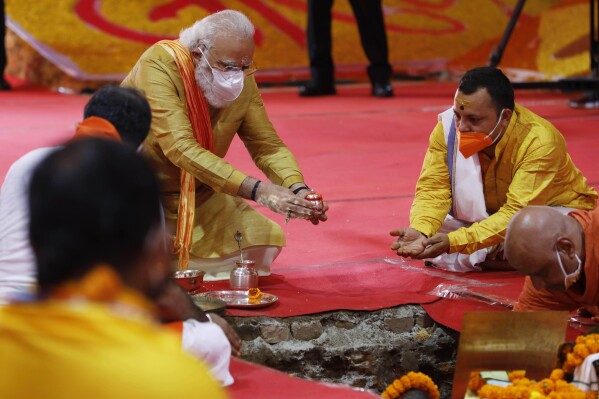[ad_1]
NEW DELHI (AP) — Three decades after a Hindu mob razed a historic mosque, Indian Prime Minister Narendra Modi will attend Consecration of a grand Hindu temple on the same site on Monday in a political move to push his party forward important national vote,
Experts say the temple dedicated to Lord Ram, the most revered deity of Hinduism, will be finalized Modi’s legacy Enduring but also controversial – as one of India’s most consequential leaders, who has sought to transform the country from a secular democracy to an avowed Hindu nation.
“From the beginning, Modi was motivated by marking his permanence in history. He has ensured this with the Ram temple,” said Nilanjan Mukhopadhyay, an expert on Hindu nationalism and author of a book on Modi.
Many see the temple inauguration as the start of the election campaign for Modi, who has been widely accused of being a staunch nationalist. support of hindu supremacy In officially secular India. It is expected that in the national elections to be held in April or May, Modi’s Hindu nationalist party will once again exploit religion for political gain and win power for the third consecutive time.
Billed as a national event by the ruling Bharatiya Janata Party, the inauguration of the temple in Ayodhya – a small town in northern India that has been a historical hotspot – is expected to resonate deeply among Hindu voters.
Many supporters of Modi hold him responsible for this Restoring Hindu pride in IndiaWhere the population of Muslims is slightly more than 14%.
“What is being done in Ayodhya, the scale at which it is being constructed right now, will actually make it like the Hindu Vatican and that is what will be promoted,” Mukhopadhyay said. “Modi will not miss a single opportunity to sell the achievement of building the temple.”
Built at an estimated cost of $217 million, the Ram temple is central to Hindus who believe Lord Ram was born at the exact spot where Mughal Muslims built the Babri Masjid over the temple ruins in the 16th century. The mosque was demolished by a Hindu mob in December 1992, sparking nationwide riots that left more than 2,000 people dead, mostly Muslims. This set in motion events that redefined social identity politics in India and catapulted Modi’s BJP from two parliamentary seats in the 1980s to current political dominance.
In the early 1990s, Modi, a little-known local leader in his native Gujarat state, also helped organize a public movement aimed at garnering support for the construction of what is now the Ram Temple at the site of the former Babri Masjid.
Muslim groups fought a decades-long court battle for the restoration of the Babri Masjid. The controversy ended in 2019 When, in a controversial decision, the Supreme Court of India called the destruction of the mosque a “gross violation of the rule of law”, but returned the site to Hindus. The court gave a separate piece of land in a separate area to the Muslims.
That horrific history is still an open wound for many Muslims, and some say the temple is the greatest political proof of Hindu supremacy ever.
“There is a fear that this government and all its allies want to wipe out all traces of Muslim or Islamic civilization from the country,” said Zia Us Salam, author of the book “Being Muslim in Hindu India”.
The number of Indian Muslims is increasing come under attack in recent years by Hindu nationalist groups, and at least three historic mosques in northern India have been embroiled in court disputes over claims made by Hindu nationalists who say they were built on temple ruins. Hindu nationalists have also filed several cases in Indian courts Demand for ownership of hundreds of historical mosques,
“On the one hand, they want to change the names of all cities whose names sound Muslim. On the other hand, they want to get rid of almost every mosque, and the courts are happy to accept petitions under any pretext,” Salam said.
The reconstruction of the temple at the disputed site has been part of the BJP’s election strategy for decades, but it was Modi – who came to power in 2014 on a wave of Hindu revivalism – who ultimately oversaw that promise after attending the event. groundbreaking ceremony In 2020.
In the lead up to its inauguration, Modi asked people to celebrate by lighting lamps in homes and local temples across the country, and said the temple would be a symbol of “cultural, spiritual and social unity”. His government has also announced closure of all its offices for half a day on Monday to allow employees to participate in the celebrations. Modi has released a postage stamp on Ram Temple and live screening of the ceremony has been planned across the country.
In many cities and towns, saffron flags symbolizing Hindu nationalism have become ubiquitous. Several other politicians, high profile film stars and industrialists are also expected to attend.
But the event will also be marked by some conspicuous absences.
Some opposition leaders are boycotting the ceremony, calling it a political gimmick and accusing the government of exploiting religion for political gains. Four prominent Hindu religious authorities have refused to attend the inauguration, two of them saying that consecrating an unfinished temple is against Hindu scriptures, and that Modi is not a religious leader and therefore not qualified to lead the ceremony. Are not.
Salam said Modi has blurred the line between state and religion by making a public display of his faith, which is enthusing his staunch supporters.
“When was the last time he served as Prime Minister? There are many instances where he has behaved either as a BJP leader or as a Hindutva mascot, rarely as the Prime Minister of India,” Salam said.
[ad_2]
Source link
